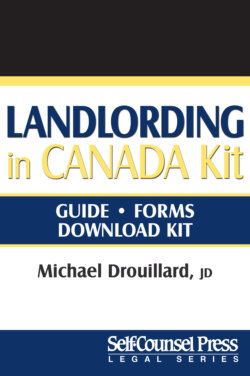Читать книгу Landlording in Canada - Michael Drouillard - Страница 33
На сайте Литреса книга снята с продажи.
Chapter 6 KNOW THE LAW — AT LEAST KNOW THE BASICS
ОглавлениеIn this chapter, you will learn to:
• Know the answers to tenancy law basics in your province before renting out your property.
• Never accept tenancy law advice from your tenant: Always double check what the tenant tells you is the law.
• Be aware of good practices to avoid discrimination: Know the difference between direct discrimination and constructive discrimination, and know the human rights legislation in your province.
• Be aware of the need to protect a tenant’s private information. Only collect the information you need, use it only for the reasons stated to the tenant, and keep the information safe.
• Be aware of the privacy rights of a tenant. Never enter a tenant’s suite without consent (following the tenancy laws of your province) and do not excessively monitor a tenant’s activities.
Property management books universally tell readers to familiarize themselves with tenancy laws in their area. This book is no different.
Few landlording books tell you what you need to know about the law. Are you supposed to print out the entire text of the Residential Tenancies Act for your province and memorize it before placing a classified ad? What are the chances of that happening?
Knowledge of tenancy law will come over time and you don’t have to be a tenancy law expert to be a successful landlord. You will find that for many legal issues, it is more important that you know where to find the answer. For instance, your provincial rental authority’s website will have information about how to obtain a Writ of Possession, the last-resort step in the eviction process. Knowing the precise details isn’t important now, because if you screen your tenant properly you might never need to apply for one.
However, before you rent out a home, you should know the answers to tenancy law basics like these:
• Does your province or territory require you to have the tenant sign anything else other than a rental agreement before the tenancy begins?
• Does your province or territory permit pet and smoking restrictions?
• What kind of deposits can you collect? Do you collect last month’s rent or a security (damage) deposit? Can you collect extra deposits for pets, keys, and garage remote controls? What about application deposits?
• Does your province require you to perform a move-in/move-out inspection report with the tenant? What recourse do you have if the tenant refuses to complete the inspection report with you?
• If your tenant doesn’t pay rent on time, brings in an unauthorized pet or occupant, conducts illegal activity, or harasses neighbours, how do you start the eviction process? In other words, what form do you serve the tenant? Where do you get this form? How should the form be served?
• Can you charge a fee if the rent is late or if the rent cheque bounces?
• If the tenant doesn’t pay rent or doesn’t move after you serve them with an eviction notice, what is the next step in the eviction process? What hearing must you apply for and what form must you fill out?
• When and how can you increase the rent? Does your province have rent controls? Do the rent controls prevent you from freely negotiating the initial rent with the tenant?
• How much notice must the tenant give you if he or she wants to move out?
• If you discover damage after the tenant has moved out and if you are permitted to collect a security deposit, what are the rules regarding deducting the cost of the damage from the deposit?
If you know the answers then you’re probably ready to advertise and begin the renting process. If you don’t know the answers, look in the back of this book where you’ll find websites for the legal resources you need. Your provincial landlord association might have a hotline you could call with questions as well. Some even offer publications — “landlord survival guides” — that detail the ins and outs of tenancy law in your area.
But what other laws should you be aware of before you place the classified ad? The following summarizes the more significant laws that affect the relationship between a landlord and a tenant.
